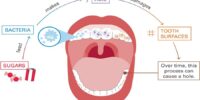The Impact Of Diet On Your Teeth: Foods To Avoid And Foods To Embrace

Your teeth are a crucial part of your overall health and wellbeing. What you eat affects your oral health, so it’s important to know which foods are good for your teeth, and which ones can be damaging. It may surprise you to learn that some of the foods we consume on a daily basis can cause long-term damage to our teeth. In this article, we’ll explore the impact diet has on our teeth and discuss which foods should be avoided and which should be embraced.
Good dental hygiene is essential for healthy teeth, but maintaining a balanced diet with plenty of vitamins and minerals is also key. A balanced diet rich in nutrients helps to reduce acidity in the mouth, as well as helping to make saliva more alkaline – both of which help protect tooth enamel from decay. Eating certain types of food also stimulates saliva production, which helps wash away plaque-causing bacteria.
On the other hand, there are certain types of food that can have an adverse effect on your oral health if consumed too often. Sugary snacks such as candy bars or soda contain acids that can break down tooth enamel over time, leading to cavities and decay. Acidic beverages like citrus fruits or sports drinks can also cause damage if not followed up with proper dental hygiene practices such as brushing after consumption.
In this article, we’ll take a look at how the foods you eat affect the health of your teeth and offer advice on what you should avoid and what you should embrace in order to maintain healthy teeth for life!
Diet Impact On Dental Health
It’s easy to think that brushing and flossing are the only factors in keeping our teeth healthy and strong. However, diet plays a big part too. When it comes to dental health, what we eat can be just as important as how often we brush our teeth. And while it’s true that sugary snacks can damage our teeth, there are plenty of other foods that can harm them too.
Our mouths contain bacteria that feed on sugar and carbohydrates, which can lead to plaque build-up and tooth decay. But this doesn’t mean that we have to avoid all carbs or sugar for good oral hygiene. In fact, embracing certain foods can actually help us keep our teeth healthy. Fruits and vegetables are great sources of vitamins and minerals that help strengthen tooth enamel. So if you want to keep your smile healthy and strong, start by eating more of these nutrient-rich foods!
Types Of Foods To Avoid
The importance of diet on your dental health cannot be underestimated. In this section, we will discuss the types of foods to avoid in order to maintain a healthy oral hygiene.
To start off, sugary treats like candy and soda should be avoided as they can cause cavities and tooth decay. Additionally, acidic food like citrus fruits can erode enamel over time. To reduce the risk of these issues, it is best to limit consumption of these types of foods.
Another type of food to avoid are those that are high in starch and carbohydrates, such as chips and crackers. Sticky foods like dried fruit also pose a problem because they cling to teeth and gums, making them difficult to remove with brushing and flossing. Here is a list summarizing the types of food to avoid:
- Sugary treats
- Acidic foods
- High starch/carbohydrate foods
- Sticky foods
It is important to take into account what kind of food you eat when considering your dental health. An unhealthy diet consisting mainly of the aforementioned types of food can lead to numerous oral health problems down the road. Therefore it is important to be mindful while selecting your meals or snacks!
Sugary Drinks And Candies Influence
The consequences of sugary drinks and candies are often overlooked. One might think that a single gummy bear won’t make much difference, but the reality is that it can have long-term impacts on your teeth. Sugary drinks and candies wear down the protective layer of enamel on your teeth and make them more susceptible to cavities. Even if you brush and floss regularly, these treats can still cause harm. They also feed bacteria in your mouth, which produces acids that erode tooth enamel.
To protect your teeth from the negative effects of sugar, it’s important to limit your intake of sugary drinks and candy. If you do indulge in these treats, be sure to brush or rinse with water after consuming them. This will help reduce their impact on your teeth by washing away sticky residue and plaque buildup. Additionally, try snacking on healthier alternatives such as fresh fruits and vegetables or nuts instead of sugary snacks. Making smart choices now will help ensure healthier smiles for years to come!
Sticky Foods
Sticky foods are highly detrimental to your teeth because they stick to your teeth and create a breeding ground for bacteria. This makes them particularly dangerous, as they can cause cavities and gum disease. Avoiding sticky food is essential for good oral health; some examples of these items include candy, dried fruit, and caramel.
On the other hand, there are also healthy alternatives that won’t stick to your teeth as much – such as fresh fruits or vegetables. These provide vitamins, minerals and antioxidants that help protect your teeth from decay and damage. Eating crunchy produce like apples or carrots gives you the added bonus of stimulating saliva production which helps wash away plaque-causing bacteria in the mouth. Incorporating these healthier options into your diet can help keep your teeth strong and healthy.
Hard Or Chewy Foods
Next up, we have hard or chewy foods. These can cause serious damage to your teeth if eaten too often. Hard candies, nuts, and even some fruits like apples can wreak havoc on your teeth if you don’t brush properly afterward. Chewing on ice is also a big no-no, as it can chip away at the enamel of your teeth.
The best way to handle these foods is to enjoy them in moderation and practice good oral hygiene afterwards. Make sure to brush with a fluorinated toothpaste twice a day, floss regularly, and use mouthwash to help fight against cavities and other dental issues caused by hard and chewy foods. Taking just a few extra minutes each day for proper oral hygiene can make all the difference in keeping your teeth healthy and strong for years to come.
Types Of Food To Embrace
It’s easy to think that all food has a negative effect on your teeth, but that’s not the case. Sure, there are some foods you should definitely avoid, but there are also plenty of dental-friendly snacks and meals available. So let’s talk about the types of food to embrace!
Before we dive into the specifics of what to eat, it’s important to note that anything in moderation is generally better than overindulging in any one thing. That being said, here’s a table with some foods and their benefits for your teeth:
| Food | Benefits |
|---|---|
| Cheese | Contains calcium which helps build tooth enamel strength |
| Apples and Carrots | High water content helps cleanse teeth while crunchy texture helps scrub away plaque |
| Yogurt | Contains probiotics which help prevent cavities from forming by altering oral bacteria levels |
| Green Tea & Coffee (without sugar) | Both contain polyphenols which fight off bad bacteria in the mouth as well as reduce inflammation around the gums |
It doesn’t have to be boring either! You can enjoy cheese cubes as a snack or top salads with crumbled feta cheese for added flavor. For an after dinner treat, try carrot sticks or an apple – both are sweet yet low in sugar! And if you’re looking for something more filling, yogurt makes a great breakfast and green tea or coffee can serve as an energizing pick-me-up throughout the day.
These are just a few examples of dental friendly foods out there – so don’t feel limited when it comes to choosing what you eat; just focus on including items from this list whenever possible and you’ll be sure to keep your teeth healthy and strong!
Dairy Products
When it comes to protecting your teeth, dairy products are incredibly important. Dairy contains several essential minerals, like calcium and phosphorous, that help build strong teeth and bones. Eating yogurt or drinking milk can also increase saliva production which helps keep the mouth hydrated and can reduce the risk of tooth decay. Additionally, cheese acts as a buffer against acid produced by bacteria in the mouth.
To get the most benefit from dairy products, choose those that are low in sugar as too much sugar can cause cavities and damage your teeth. Also consider eating foods like ricotta cheese or cottage cheese as they don’t require chewing and are less likely to contribute to tooth decay. So when it comes to dairy products, embrace them! They can be beneficial for your oral health if you consume them in moderation.
Calcium-Rich Vegetables
It’s no secret that calcium is an essential mineral for healthy teeth. A survey conducted in 2020 showed that only 12% of adults in the US consume the recommended daily amount of calcium. Vegetables are a great source of calcium and can help to meet your daily intake needs. Some great options include kale, broccoli, bok choy, spinach and collard greens. All of these vegetables are packed with vitamins and minerals that promote strong teeth and bones.
In addition to providing calcium, these vegetables also contain other beneficial nutrients like Vitamin A and Vitamin C which have been linked to reducing cavities. Eating these vegetables raw or lightly cooked is best as it maximizes their nutrient content. Including them in your diet on a regular basis will give you the necessary minerals for healthy teeth and bones.
Whole Grains
Whole grains are an important part of a healthy diet. They provide essential vitamins, minerals, and fiber that can help to promote good oral health. Eating whole grains on a regular basis may help to reduce the risk of caries and periodontal disease. Whole grains also supply essential nutrients that could reduce inflammation in the mouth, helping to prevent gum disease and tooth decay.
When it comes to whole grain choices, opt for brown rice, quinoa, amaranth, and buckwheat instead of white rice or white bread. These grains contain more fiber and nutrients than their refined counterparts. Additionally, look for products labeled as “whole grain” or “100 percent whole wheat” when shopping at the supermarket. By consuming more whole grain foods, you can give your teeth the nutrition they need to stay healthy and strong.
Fruits And Nuts
Switching gears from whole grains, let’s now focus on fruits and nuts. Fruits and nuts are a wonderful source of essential vitamins and minerals for your oral health. Vitamin C helps to repair and restore gum tissue, while calcium helps to strengthen teeth. Nuts contain phosphorus which is important for producing saliva, which prevents cavities by washing away food particles and neutralizing the acids in your mouth.
Fruits like apples, strawberries and oranges are all beneficial to your dental health as they contain vitamins A and C, as well as fiber which stimulates saliva production. Eating these fruits can help reduce the acidity in your mouth, preventing tooth decay. Nuts, such as almonds, walnuts and peanuts also provide healthy fats, proteins and minerals which help keep your teeth strong. Just be sure to eat them in moderation as they can be high in calories!
In summary, eating fruits and nuts can be incredibly beneficial for your dental health. They provide essential vitamins and minerals that help build strong teeth and gums while also stimulating saliva production to protect against cavities. These foods should be eaten in moderation however, as they can be high in calories if consumed too frequently
Green Tea
Green tea is one of the most beloved beverages around the world. It’s packed with health benefits, but did you know it can also help improve your dental health? Let’s explore how drinking green tea can make a positive difference in your teeth and gums:
- Green tea is rich in antioxidants, which fight against bacteria that cause cavities.
- Its potent anti-inflammatory properties reduce inflammation and gum sensitivity.
- Its antibacterial action helps to protect from plaque build-up and tooth decay.
By incorporating this beverage into your daily routine, you can quickly benefit from its powerful effects. Not only does green tea provide numerous health benefits, it also tastes delicious! With its sweet flavor and pleasant aroma, there’s no better way to enjoy a cup of tea while taking care of your teeth at the same time.
Regular Dental Visits
Good oral hygiene is essential to protecting your teeth and gums, but regular dental visits are also important. Visiting the dentist every six months can help identify any potential issues early on, before they become more serious. During these visits, the dentist will take x-rays of your teeth and look for any signs of decay or damage. The dentist may also perform a thorough cleaning to remove tartar and plaque buildup from your teeth.
Regular visits to the dentist can also be beneficial for preventive care, such as getting sealants applied to molars or fluoride treatments for those at risk of cavities. Additionally, dentists can provide advice on brushing and flossing techniques, as well as dietary advice to further protect your teeth. Ultimately, regular dental visits are essential for good oral health and should not be overlooked.
Frequently Asked Questions
How Can I Make Sure My Diet Is Good For My Teeth?
When it comes to your oral health, creating a diet that helps your teeth is essential. But how can you make sure the food you eat is good for your teeth?
There are a few key tips to keep in mind when building a tooth-friendly diet:
- Avoid:
- Sugary snacks and drinks
- Acidic foods and drinks
- Sticky, chewy candy and desserts
- Embrace:
- Fruits and vegetables
- Dairy products such as cheese, yogurt and milk
- Lean proteins such as nuts and seeds
It’s recommended to drink plenty of water throughout the day, which can help balance out the acidity in your mouth. Additionally, limiting snacking between meals can help reduce plaque buildup on your teeth. Finally, regular brushing and flossing are necessary to remove any excess food particles or bacteria that may be trapped in hard-to-reach places. With these simple steps, you can create a diet that’s good for your teeth!
Are There Any Foods That Are Both Good For My Teeth And Taste Good?
There is no doubt that the foods we eat can have a huge impact on our teeth, but not all foods are created equal. So the question remains, are there any foods that are both good for our teeth and taste good? The answer is yes! The key is to find a balance.
At its core, it’s all about finding the right balance between sugary and acidic foods and healthier alternatives. While it may be tempting to indulge in sweet treats now and then, it’s important to remember that too much sugar can lead to tooth decay. On the other hand, embracing whole grain carbohydrates like oats or quinoa can help keep your teeth sparkling. Not only do they provide essential vitamins and minerals, but they also help neutralize acidity in the mouth – making them an ideal choice for healthy teeth.
The trick is to find a variety of tooth-friendly options that also satisfy your taste buds. Adding crunchy fruits and vegetables such as apples and carrots to your diet provides an added bonus by helping cleanse plaque from your teeth while providing essential vitamins and minerals for overall health. Incorporating these nutritious snacks into your daily routine can make all the difference in keeping your pearly whites healthy – without sacrificing flavor!
Are There Any Home Remedies To Reduce Dental Plaque?
When it comes to dental hygiene, plaque can be a major problem. Are there any home remedies to reduce dental plaque? Fortunately, yes. There are several easy steps you can take to reduce plaque and improve your overall oral health.
Here are some simple home remedies for reducing plaque:
- Cleaning:
- Brush your teeth twice daily with fluoride toothpaste.
- Floss at least once a day.
- Diet:
- Avoid sugary and starchy foods as they can feed bacteria in the mouth and increase plaque levels.
- Increase your intake of fibre-rich foods like fresh fruits and vegetables, which helps remove debris from the teeth.
Making these simple changes to your daily routine can help prevent the buildup of plaque that leads to cavities and other oral health issues. It’s also important to visit your dentist regularly for professional cleanings and checkups so that any potential problems can be addressed early on before they become more serious. With just a few lifestyle changes, you can ensure your teeth stay healthy and strong for years to come!
Is Flossing Necessary For Good Dental Hygiene?
The bristles of a toothbrush, symbolising the fight against plaque and bacteria, are essential to maintain good dental hygiene. But is flossing necessary for oral health too? The answer is a resounding yes! Flossing can significantly reduce plaque buildup, which in turn helps to prevent cavities and gum disease.
Flossing reaches areas that brushing alone can’t reach; it removes food particles and plaque from between the teeth and below the gum line. It also stimulates the gums, increasing circulation and helping to keep your gums healthy. So flossing should be part of your daily routine just like brushing your teeth.
Flossing isn’t difficult or time consuming either; it simply requires patience and care. Once you get used to it, you’ll find that flossing takes only a few minutes each day. And if you use an interdental cleaner such as water picks or small brushes, they can help make cleaning between your teeth even easier. With regular flossing you can ensure that your teeth remain healthy and free of decay-causing bacteria!
How Often Should I Visit The Dentist For A Check-Up?
It is essential to maintain regular visits to the dentist for a check-up in order to ensure good dental health. It’s recommended that adults have a dental check-up every six months, while children should visit the dentist at least once a year. During these visits, the dentist will examine your teeth and gums for any signs of tooth decay or gum disease.
Your dentist can also offer advice on how to improve your oral health, such as brushing and flossing regularly and making dietary changes. They can also provide you with tips on how to avoid certain foods that can damage your teeth, such as sugary snacks and drinks. Additionally, they may suggest treating yourself to tooth-friendly foods such as crunchy fruits and vegetables, dairy products, and whole grains.
Regular visits to the dentist are an important part of maintaining good oral health. Your dentist will be able to give you advice on how best to care for your teeth and gums so that you can keep your mouth healthy for years to come.
Conclusion
It’s important to remember that everyone has different dietary needs and it’s important to find what works for you. Eating a balanced diet that includes plenty of fruits, vegetables, dairy products and whole grains is key for keeping your teeth healthy. Avoiding sugary, starchy and processed foods can help reduce plaque buildup and tooth decay. Regular visits to the dentist for check-ups are also essential in maintaining good oral hygiene.
Flossing daily is a great way to keep your pearly whites looking their best. It may not be the most pleasant activity, but it can make a huge difference in reducing plaque buildup between your teeth. Additionally, there are some home remedies that can help keep your teeth sparkling clean such as brushing with baking soda or rinsing with saltwater.
By making a few simple changes to our diets and taking proper care of our teeth, we can ensure that our smiles stay bright and healthy. Eating wisely and practicing good dental hygiene will result in fewer trips to the dentist’s office, saving us time and money in the long run!










